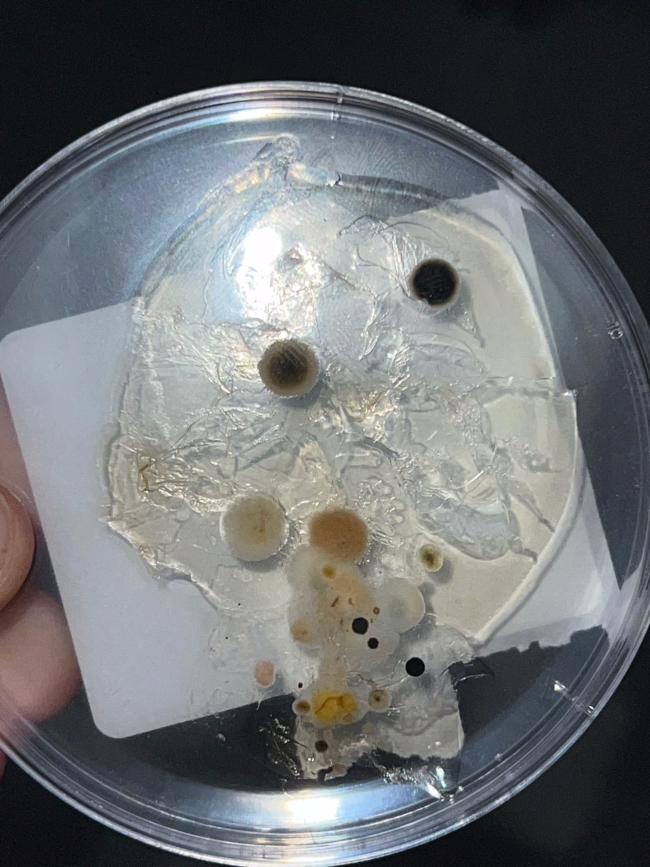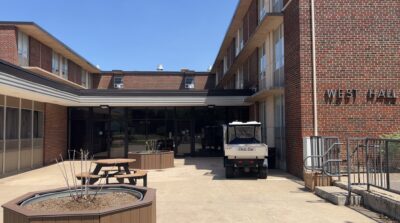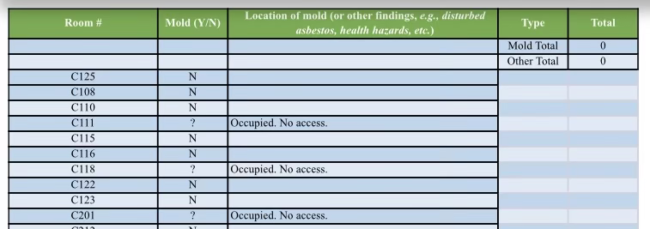Mold growth detected in UCO dorms once again
Chandler Coleman, Anne Marie Hagen, Ainsley Martinez, Sam Kozlowski, Tanner Pipins

Mold growths found from samples taken in West Hall vents. (Sam Kozlowski/The Vista)
Previously in 2019, stories described the displacement of over 300 students, due to the dangerous amounts of mold found in the dorms, according to UCentral News. West Hall, built in 1962. “Construction of these dorms goes to the lowest bidding contractor and the buildings are only meant to last 30-50 years,” according to an anonymous source working directly within UCO’s housing department. Samples taken in 86 year-old Murdaugh Hall do not show any evidence of mold growth in contrast to West Hall. Murdaugh Hall was renovated in 2019-2020, however, West Hall not been refurbished as recently. Among the dorms at UCO, Murdaugh Hall and West Hall are cheaper than the Quad and the Commons, with Murdaugh having the cheapest rates.
An additional test kit was used to gather samples from a dehumidifier console positioned outside the women’s restroom on the first floor of Murdaugh. The results came back negative.
Recent rain showers in Oklahoma have created perfect conditions for mold to grow. Feeding on organic matter such as rotting food, dust and dirt, mold thrives in warmer environments, similar to temperatures that humans find comfortable, according to Dr. Clark Ovrebo, professor of Microbiology at UCO.
Mold spores produce toxic waste in their spores known as mycotoxins. Common side-effects of mold exposure include: throat irritation and worsened asthma. Respiratory problems are most likely to be found in young children, people with asthma, and those with long-term exposure to high-levels of mold. Also known as mildew, mold are types of fungi that grow due to the feeding of organic compounds.
Health and wellness is one of UCO’s “Central Six” main missions for students, contrary to the health issues presented in the lower-cost dorms.

(Sam Kozlowski/The Vista)
Both Murdaugh Hall and West Hall are the two dorms experiencing most of the mold, water damage and safety issues. These conditions are due to old age, substandard hygiene from some residents, along with a lack of care by housing management.
Not only does West Hall have mold, but it is the only living space campus that has asbestos in the ceilings, according to another source who wanted to remain anonymous and works in UCO Housing. Originally used for its fire-stopping properties, asbestos is now banned in modern construction because it is a Group 1 carcinogen.
Asbestos is known to cause cancer. The charcoal-like substance is most dangerous when removed from buildings because inhaling the dust is similar to inhaling microscopic fiberglass, which causes catastrophic lung damage. Although there are approximately 4-5 layers of paint protecting students from asbestos, it is still a potential hazard.
Even one instance of contact with asbestos can lead to health problems later in life, according to the United States Environmental Protection Agency (EPA).
As UCO has continued to deal with mold in dorms throughout the years, concerns have now been raised about the presence of asbestos in West Hall. Despite no immediate risk, the future of West Hall is uncertain.
University records given to UCentral showed all affected rooms at the end of the previous Spring semester were cleared from any mold by August. According to results of the open records request we received from Brent Miller, Director of Risk Management at UCO.

Screenshot from the open records request submitted to the univeristy. (UCO/Provided)
The discovery of mold and asbestos in West Hall is a serious matter that can cause future health problems for those who currently reside in the dorms. The health risks associated with exposure to mold and asbestos can have life-threatening consequences, despite wellness being one of the university’s six transformative tenants.
Chandler Coleman, Anne Marie Hagen, Ainsley Martinez and Tanner Pipins contributed to this report.

